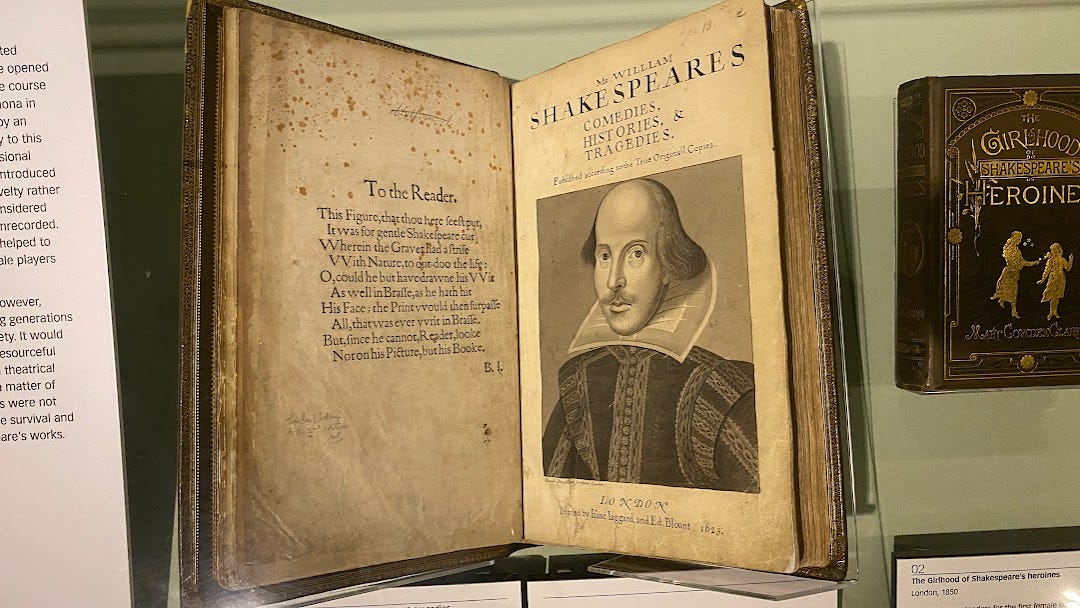This is part of my ongoing series on Reading the Western Canon. See here for an introduction to the series.
Intro
Our wills and fates do so contrary run
That our devices still are overthrown,
Our thoughts are ours, their ends none of our own.
--The Player King in Hamlet
Well, we made it through the Theocratic Age, and by Bloom's reckoning we're into the Aristocratic Age. The first of these authors (in Bloom's book, not chronologically) is Shakespeare. Shakespeare is basically the core of Bloom's canon, the center around which everything resolves. Bloom has lots to say about Shakespeare, both in The Western Canon, and also in another book, Shakespeare: The Invention of the Human. I've been reading this as a companion to the books themselves.
It's remarkable to see how differing Bloom sees things than I do. Part of this is that he's read the plays many times, myself having only read them once. In addition, he's read nearly every book one can imagine, so he's constantly referencing other authors and books. Bloom pulls things out that I never really thought of, but once he points them out, the books are greatly enriched. Among these takes are Bottom being one of the best comics in all of literature, Hamlet being smart enough to be fully beyond our analyzation, and Falstaff's utter vivacity cementing him in the center of the Canon itself.
I've fully accepted I'm not going to understand everything in these works, especially not compared to Bloom's vivisection. But, that's true for all of the brilliant works in the Canon, and the challenge for us amateurs is to pick out what we can.
So far, I've been appropriately blown away by these monumental books. While I'm less willing to lavish praise on each and every work, and sometimes find the plays too full of references and in-jokes, there's no denying that Shakespeare at his best is unbeatable. It is almost inconceivable that a peasant in Stratford-upon-Avon wrote Hamlet, Othello, Macbeth, and King Lear (and indeed, some don't believe it). To write one of these would be an achievement for a lifetime; to write them all, along with 35 other often-equal plays, is to ascend to the very pinnacle of human achievement.
With all that hype in mind, let's dive in.
Works read
I didn't want to read every single play by Shakespeare, despite Bloom suggesting so in his list. I knew a few were co-written with others, and some are written off even by diehard Shakespeare fans. My final list looked like this, and I'm reading them roughly in this order:
Titus Andronicus
Love's Labour's Lost
The Two Gentlemen of Verona
Romeo and Juliet
A Midsummer Night's Dream
Julius Caesar
The Merchant of Venice
Richard III
Much Ado About Nothing
Richard II
King Henry IV, Part 1.
Henry IV, Part 2
Henry V
As You Like It
Twelfth Night or What You Will
Hamlet
Troilus and Cressida
Measure for Measure
Othello
Macbeth
King Lear
Antony and Cleopatra
Coriolanus
The Winter's Tale
The Tempest
I excluded a few of the later tragedies and romances (Timon of Athens, Pericles), along with some of the very early histories and comedies (Comedy of Errors, King John). If you think I missed an important one, do let me know on Twitter or via my contact form!
Titus Andronicus
This is one of Shakespeare's very first plays, and it shows. Bloom notes that Shakespeare is really responding to (and potentially intentionally parodying) the outrageous tragedies of Marlowe. Marlowe was hugely influential on Shakespeare, but his characters were known to be very hyperbolic and over-the-top. In Titus Andronicus, Shakespeare wears this influence on his sleeve.
Through the entirety of the play, one wonders whether the appropriate reaction is revulsion or laughter. One can't help but feeling the entire thing is a parody with these lines (IV.2):
DEMETRIUS: Villain, what hast thou done?
AARON: That which thou canst not undo.
CHIRON: Thou hast undone our mother.
AARON: Villain, I have done thy mother.
This comes just a few scenes after one of the most horrific scenes in all of Shakespeare, the on-stage rape and dismemberment of Lavinia. This makes me think the entire work is Shakespeare's attempt to push the boundaries and see how his audience would react to such horror. One can imagine the audience eating it up, enjoying the sheer absurdity and horror of it all, like a 16th-century slasher film.
That said, this work remains entirely skippable. None of the characters are very strong, and the entire thing is just so over-the-top. Barely any of the Bard's later genius shows in this first attempt at tragedy.
The Taming of the Shrew
This play is infamous for being misogynistic, starting with the title itself. I think this charge is largely true, and there are many passages that are pretty rough to read in 2022 (Petruchio literally starving Kate into submission comes to mind). That said, the play shines in its best moments, and is worth a read to see Shakespeare's fledgling comedy.
One fact that lightens some of the darker scenes is the entire conflict between Kate and Petruchio takes place in a play-within-a-play, making the reader not entirely sure what to take at face value. I also think this play is much better seen than read, a feature common much more to Shakespeare's comedies than the tragedies. Actors' performances really shape our understanding of what the characters think of each other, something very much helpful in a play full of irony like this.
The Two Gentlemen of Verona
To be honest, I remember very little of this one, as I read it before taking serious notes, and before I decided to pare down my to-read list. I guess that means it's pretty skippable and not worth a read.



